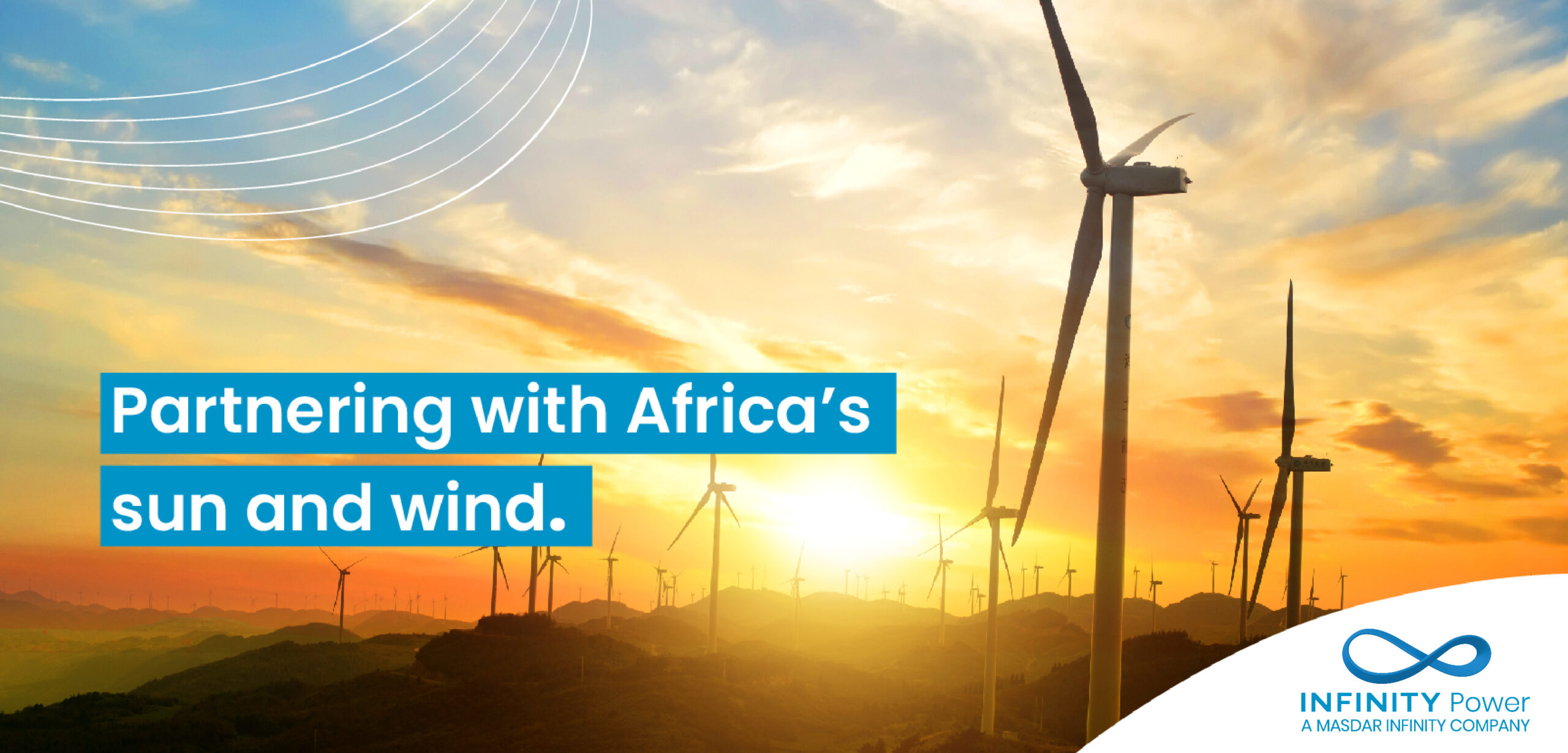- Vestas begins trial operations at Gulf of Suez wind farm + Actis is reportedly lining up green loans for Gabal el Zeit. (Wind)
- Loss and damage committee agrees on final text of recommendations to take into COP28. (Climate Policy)
- Acwa Power, Sabic and Emirates Steel Arkan report 3Q earnings. (Earnings Watch)
- UAE signs cooperation MoU with Jordan + talks trade relations with the US. (Climate Diplomacy)
- Tunisian cabinet greenlights IBRD loan for Elmed interconnector project. (What We’re Tracking Today)
- Oman operates 500 MW solar plant remotely and Wakud ramps up WtE services. (Also on Our Radar)
- UAE’s Ma Hawa produces clean water from air using heat exchange tech. (Green Tech)

Monday, 6 November 2023
Vestas begins trial operations at Gulf of Suez wind farm + Actis is reportedly lining up green loans for Gabal el Zeit
TL;DR
WHAT WE’RE TRACKING TODAY
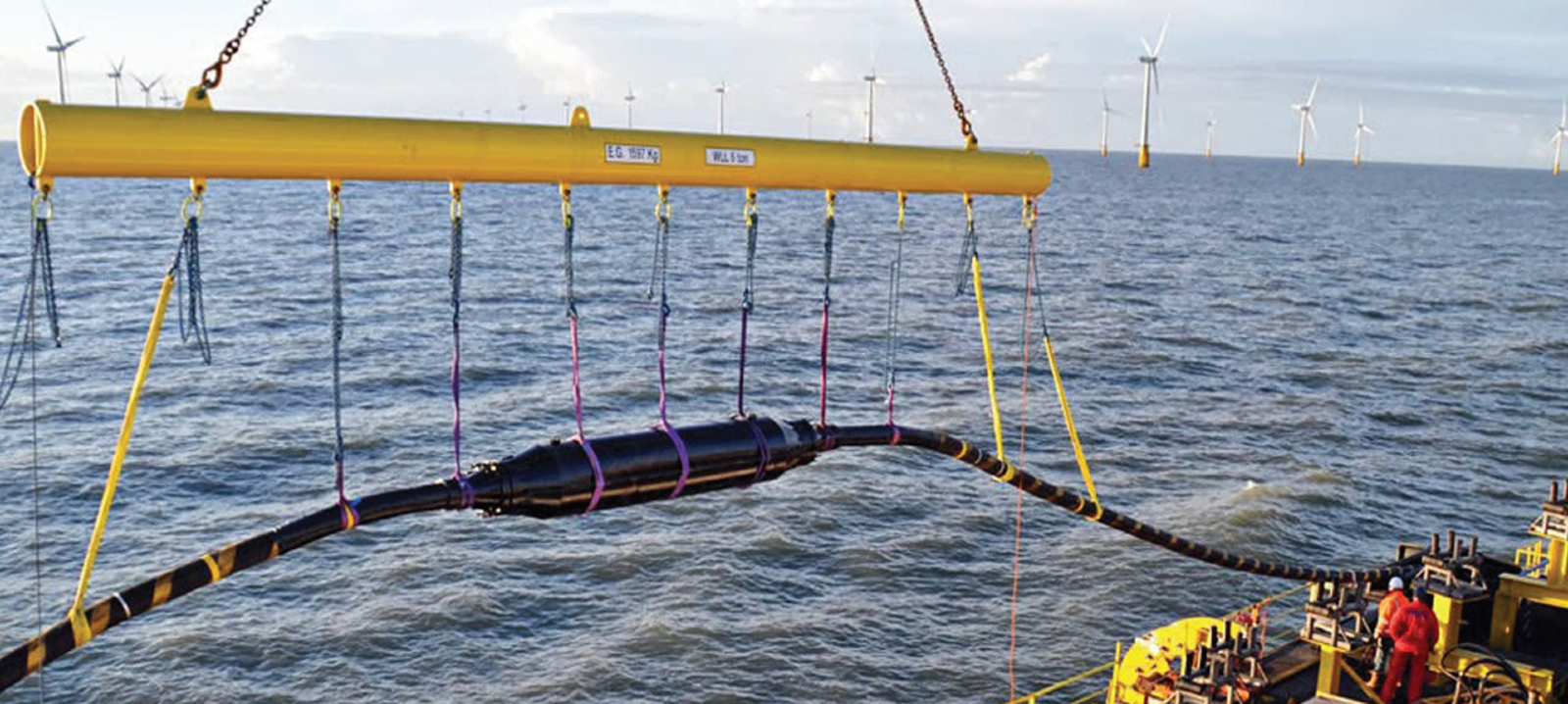
Good morning, ladies and gents. It’s a busy start to the week with quite a few updates from our region and aboard. Chief among them is a significant update in the run up to COP28, with loss and damage talks coming to an end over the weekend. Let’s dive right in.
THE BIG CLIMATE STORIES- An international consortium led by Denmark’s wind turbine developer Vestas began trial operations on a 250 MW wind farm in Egypt’s Gulf of Suez, a government source told Enterprise Climate. Over in Abu Dhabi, a draft of recommendations on the formulation of a loss and damage fund aimed at assisting climate-vulnerable countries was approved in the transitional committee (TC) meeting on Saturday, with TC members nominating the World Bank to serve as trustee and host of the fund for a four-year term.
The story also got ink the international press over the weekend: Reuters | The Guardian | Washington Post | The Financial Times
^^ We have the details on these stories and more in the news well, below.
WATCH THIS SPACE- Tunisian cabinet greenlights IBRD loan for Elmed project: Tunisia’s Cabinet approved a draft bill that will see the World Bank’s International Bank for Reconstruction and Development (IBRD) provide a USD 268 loan for Tunisia’s planned Elmed electrical interconnection project with Italy, Tunis Africa Press Agency reports. The loan was signed in June with the Tunisian Electricity and Gas Company (STEG). The Elmed project is estimated to cost EUR 850 mn (c.USD 929 mn).
Others are helping: The EBRD is set to sign off in December on a sovereign-backed senior loan of up to EUR 45 mn to STEG for the Elmed project with Italy. The EU’s Connecting Europe Facility (CEF) is contributing a grant of EUR 307.6 mn for the project. Other lenders include the EIB, KfW, and the World Bank.
REMEMBER- The Tunisia-Italy 600 MW subsea interconnector will be operational by 2029, transporting 400-600 MW of clean power generated from hydroelectricity. The project is set to offset emissions by 525k tons of CO2 a year.
HELP SUPPORT GAZANS-
Want to support relief efforts in Gaza, but don’t know how? We’ve got you. More than a mn people in Gaza have been thrown from their homes and every human being there lacks access to food, water, and fuel amid the most intense bombardment any population has endured this century. The charities we’re listing below are regional organizations working on Gaza relief that we think you can trust if you want to make a donation.
#1- Egyptian Red Crescent Society is one of the nation’s leading providers of humanitarian and emergency medical services. The Egypt Red Crescent accepts donations in EGP online and is on Fawry with the service code 99981. You can also donate to the organization through this Banque du Caire account: 49/403/30 (EGP) or 1065/601/30 (USD — code: BCAIEGCX030).
#2- The Emirates Red Crescent Authority has launched the Tarahum — For Gaza campaign and is accepting donations online via What’s App, SMS, Apple Pay, credit card, or bank transfer to ADIB (AE370500000000020000417).
#3- The King Salman Humanitarian Aid and Relief Center has launched the Sahem campaign accepting donations via their website, mobile apps on Apple Store and Google Play, or bank transfer to Al Rajhi Bank (SA5580000504608018899998).
#4- UNICEF has been on the ground in Gaza since the start of the crisis, providing urgent supplies and aid. You can donate to the agency directly in your local currency using your credit card here.
ALSO- The folks at Talabat are processing donations for a range of Gaza relief appeals by charities including the Egyptian Food Bank, Misr El Kheir and the Emirates Red Crescent Authority’s Tarahum campaign. You can make the donation via the Talabat app using your credit card.
|
***
YOU’RE READING ENTERPRISE CLIMATE, the essential MENA publication for senior execs who care about the world’s most important industry. We’re out Monday through Thursday by 5am Cairo / 5am Riyadh / 6am UAE.
EXPLORE MORE OF ENTERPRISE ON THE WEB — tap or click here to read EnterpriseAM, EnterprisePM, and The Weekend Edition on our powerful new website packed with reader-friendly features.
Were you forwarded this email? Get your own subscription without charge here or reach out to us on climate@enterprisemea.com with comments, suggestions and story tips.
***
CIRCLE YOUR CALENDAR-
Turkey will host the GCC-Türkiye Economic Forum from Saturday 11 November to Monday, 13 November in Istanbul. The forum aims to bring together key ministers and state officials from the Gulf countries and Turkey to explore areas of potential investments and commercial ties and to establish a network for joint projects in the energy, defense, banking, retail, and transportation sectors. The event is organized by the Gulf Research Center and Turkey’s International Cooperation Platform.
The UAE will host the MENA Solar Conference from Wednesday, 15 November to Saturday, 18 November in Dubai. The event will focus on all things photovoltaic, with a full programme on PV materials and devices, future technologies, PV reliability, and forecasting for performance assessment. The conference will also touch on how developments in system operations, concentrated solar power, and grid integration are necessary for the green transition. This will be the first scientific and technical conference specializing in solar energy systems in the region.
The UAE will host the Aviation and Alternative Fuels conference from Monday, 20 November to Friday, 24 November in Dubai. The event will bring together senior government officials and international organizations to assess progress in the development and deployment of sustainable aviation fuels (SAFs) and lower-carbon aviation fuel (LCAF) measured according to the targets outlined in the 2050 Vision for SAF, agreed upon at the last Aviation and Alternative Fuels conference in 2017.
The UAE will host the Abu Dhabi Finance Week (ADFW) from Monday, 27 November to Thursday, 30 November in Abu Dhabi. The event will gather government officials, banks, financial institutions, and VCs to delve into today’s economic, technological, and sustainability conversations.
Check out our full calendar on the web for a comprehensive listing of upcoming news events, national holidays and news triggers.
WIND
Vestas begins trial operations at Gulf of Suez wind farm + Actis is reportedly lining up green loans for Gabal el Zeit
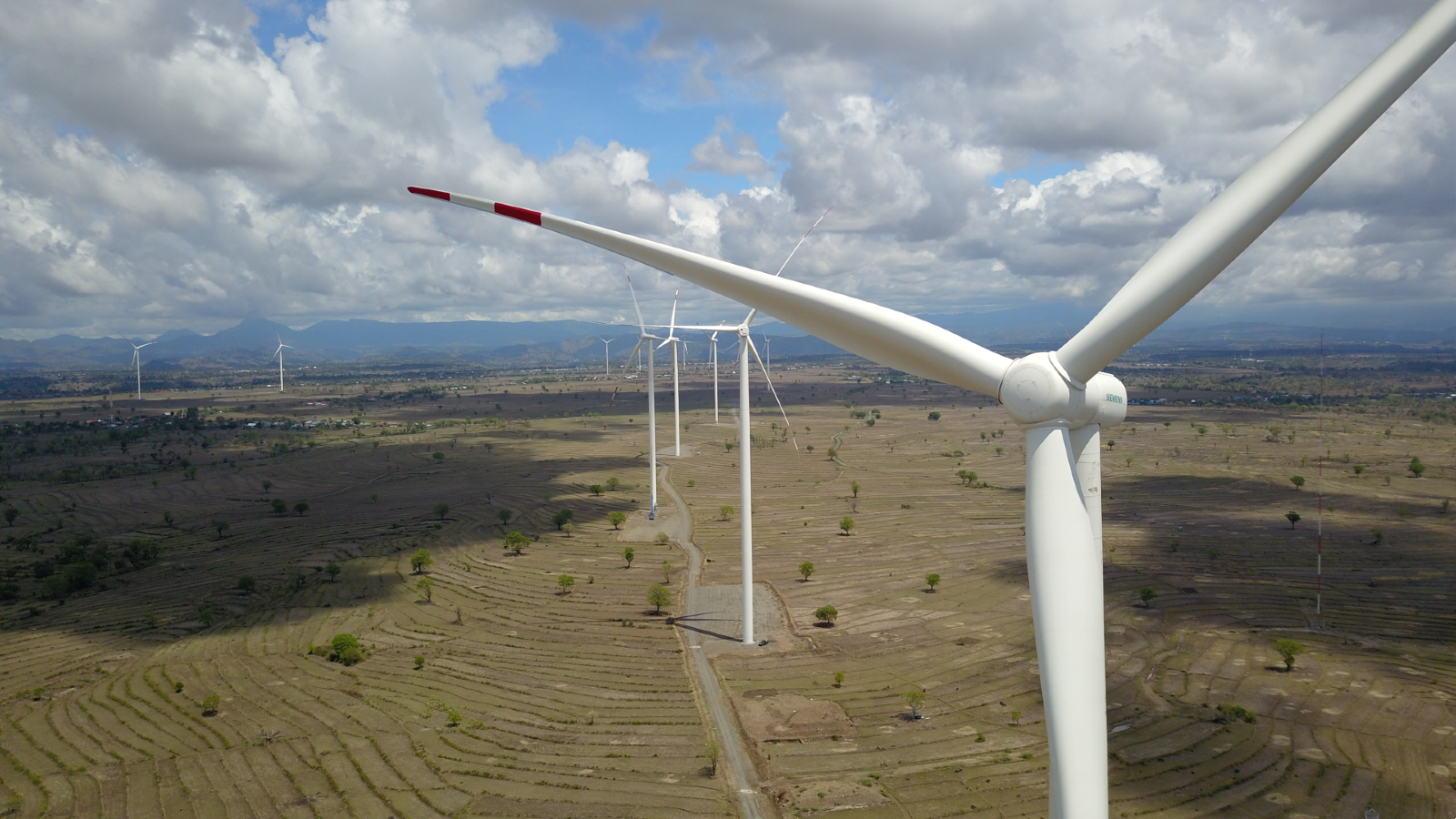
Vestas kicks off trial operations at Egyptian wind farm: An international consortium led by Denmark’s wind turbine developer Vestas began trial operations on a 250 MW wind farm in Egypt’s Gulf of Suez, a government source told Enterprise Climate. Trial runs will last for three weeks before full-scale commercial operations commence and the company hands over operations to Egypt’s New and Renewable Energy Agency (NREA) by December, the source added. Vestas will handle maintenance on the farm for three years after commercial launch.
We knew this was coming, but there are some updates: The project — owned by NREA and implemented by a Vestas-led consortium — had an expected price tag of EUR 220 mn, which has now been adjusted to an estimated investment ticket of EUR 250 mn, Vestas reportedly told Al Arabiya. The project is being funded through an agreement between Egypt and EU financial institutions, including the French Development Agency, the EU, the European Investment Bank, and the KfW Development Bank, with the “bulk of the financing already disbursed” by undisclosed lenders, and the remainder set to be extended at a later date, the news outlet notes without specifying the portion of funding extended to date.
IN OTHER EGYPT WIND SECTOR NEWS- UK’s Actis is lining up its green loans ahead of Egypt’s Gabal el Zeit acquisition: UK equity investment firm Actis will reportedly incur USD 250 mn in green loan debts from a mix of Chinese and EU lenders to finance its efforts to acquire shares in the second phase of Egypt’s state-owned 585 MW Gabal el Zeit wind farm, Al Borsa reported last week, citing people it says have knowledge of the matter. The company’s planned credit lines will finance the bulk of the acquisition, and it will need a further USD 100 mn beyond its planned green loans to be privately financed — through an agreement with Egypt’s Sovereign Wealth Fund — in a bid to acquire the power plant’s second stage, Al Borsa notes. Phase two might cost as much as USD 400 mn to complete, Actis representatives reportedly told Al Borsa.
REMEMBER- Actis has had its eyes on Egypt’s Gabal el Zeit for sometime: Actis was expected to submit a binding offer to acquire the Gabal El Zeit wind farm last month after wrapping up its due diligence, a source at the Electricity Ministry told Enterprise at the time. Actis’ offer valued the wind farm at some USD 300 mn back then, but the government said it was looking to push that figure to somewhere between USD 350-400 mn. Egypt said last month it is looking to finalize the purchase this month at the maximum.
CLIMATE POLICY
Loss and damage committee agrees on final text of recommendations to take into COP28
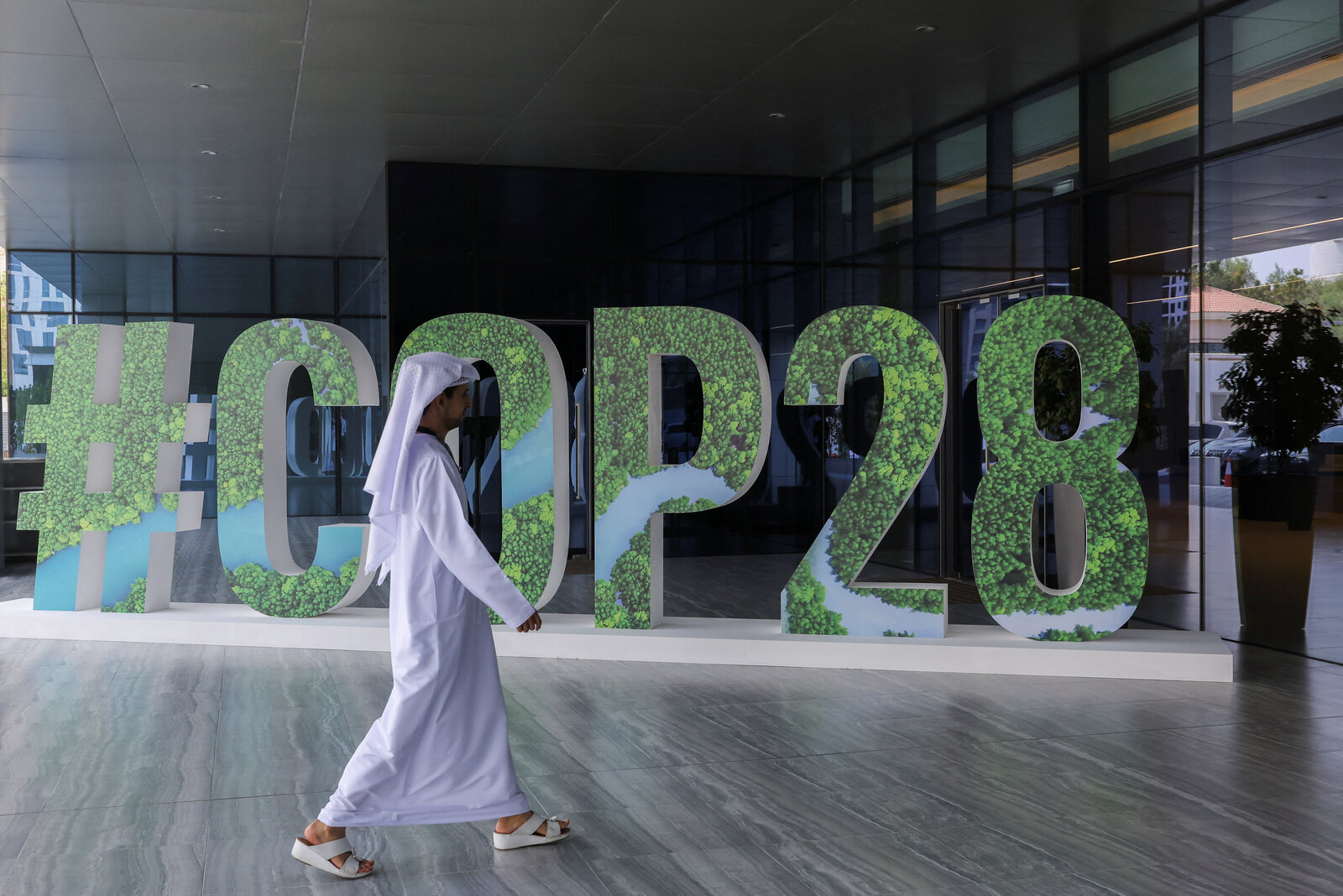
Loss and damage fund talks agree on recommendation text by a hair's breadth: The final text (pdf) that will be presented to governments at COP28 recommending how the loss and damage fund will be operationalized was finally approved over the weekend, despite reservations by developing nations and the US, Reuters reported on Saturday. The approval came in the final minutes of the fifth transitional committee (TC) meeting in Abu Dhabi, which was called for in a last-ditch attempt to enter COP with recommendations, after the fourth (and what meant to be the last) meeting in Aswan failed to reach a consensus. President Designate Sultan Al Jaber welcomed the committee's recommendations and said that they would pave the way for an agreement at COP28, the newswire added. The TC — which represents a geographically diverse group of countries — agreed to recommend the World Bank serve as trustee and host of the fund for a four-year period, a point that has caused divisions between the global north and south, Reuters explains.
REMEMBER- Why aren’t developing countries keen on having the World Bank as the fund’s host? Delegates from developing nations argue that the multilateral lender may not be fit for providing green financing, given that it often views climate projects as too risky for investment, and its internal politics can hinder equal accessibility to funds. The Loss and Damage Corporation (L&DC) also mentioned concerns over the Bank’s heavy emphasis on loans and debt in its approach, as well as the control that the US and other developed countries have on its decision making. Additionally, there is a risk of outsized influence over the fund, resulting in high fees for recipient countries, Reuters added.
Developed countries need to step it up: The TC agreed to recommend that developed countries be “urged” to provide support to the fund, but failed to state that wealthy nations are under strict financial obligation to do so, the newswire reported. The invitation is voluntary and restricts support to setting up the fund rather than providing money for it. There was also no commitment that developed countries will take the lead on providing grant-based finance, L&DC said, or an agreement on the size of the fund despite experts already identifying that at least USD 400 bn is needed for loss and damage finance each year.
The US blocked consensus: The US stood as the only TC member blocking consensus by asking for last-minute changes to the text after all other TC members had already agreed to the “imperfect text,” L&DC said. The US demanded further changes regarding the sources of funds despite all requirements for developed countries being outlined as voluntary. “We regret that the text does not reflect consensus concerning the need for clarity on the voluntary nature of contributions,” a US State Department official told Reuters. Western countries have been pushing to have heavy emitters like China and Saudi Arabia put money into the fund and proposed that the fund receives capital from a broad range of sources rather than relying on developed countries, the Financial Times reported.
Looks like it will be a loan-centered fund: The text suggested that loans and ins. be provided by the fund despite concerns that this would increase the indebtedness of developing countries. While innovative sources of finance were mentioned, there were no outlined principles to ensure they would be equitable, or any details on the process or timeframe to get them contributing to the loss and damage fund.
ALSO- Divide persists over role of carbon capture in fossil fuels phase-out: The world’s nations remained at odds over an agreement to end new oil and gas projects during the pre-COP talks in Abu Dhabi last week, Financial Times reported last week. France, Spain, Ireland, Kenya, and 11 other countries called for the phasing out of fossil fuel production at the preliminary talks, and another group of 15 countries — called the High Ambition Coalition — said that carbon capture and storage (CCS) technologies should not be used to delay climate action. The coalition, along with the IPCC, suggested that CCS be used only in hard-to-abate sectors such as steel and cement, while warning against their use for power generation. On the other hand, fossil fuel producers, especially in the Middle East, pushed for CCS to be given a greater role in policy agreements.
AND- COP28 presidency releases net-zero charter to mobilize the private sector: The COP28 presidency has launched a charter aimed at encouraging the private sector to commit to a transition plan to achieve net-zero by 2050, with interim emission reduction targets and annual progress reports, according to a statement (pdf) published last week. Companies that sign the charter under the conditions outlined could be featured on the COP28 website. The charter is part of the Recognition and Accountability Framework for non-party stakeholder climate action (pdf) currently being drafted by the United Nations Framework Convention on Climate Change. The charter emphasizes that the private sector represents the majority of the world's energy consumption and greenhouse gas emissions, making it a crucial player for driving the global goal to cut emissions by 43% by the end of the decade.
Transparency is key to ensuring accountability + progress in meeting targets: The charter sets a condition that the net-zero targets determined by the private companies must be either through a net-zero aligned national pledge, an internationally recognised net-zero initiative that holds members accountable, or be done individually with a strategy that is commensurate with public, third-party validation that carries out an accepted science-based review process. A progress report will be issued by December 2024 to verify that signatories have taken the actions outlined in the charter.
OTHER COP28 STORIES WORTH KNOWING ABOUT THIS MORNING-
- AUC is launching a sustainability training program in the UAE: The American University in Cairo has signed an MoU with the UAE’s Climate Change and Environment Ministry, Dubai International Financial Centre (DIFC) Academy, and the UAE University Leadership Council to deliver an “executive diploma in sustainability” to train 200 public servants in the UAE. The program consists of four sustainability models focusing on water, food, green energy resources in the region, and grassroots innovation. (Statement, pdf)
- Francis will be the first pope to attend a COP summit: Pope Francis will be in Dubai from 1-3 December to attend the COP28 climate summit, he told Italy's state-run RAI television TG1 news on Wednesday. The pope’s attendance will mark the first time a pontiff attends the climate summit since it was first founded in 1995. The pope has made climate protection one of the priorities of his papacy, and had a meeting last month with COP28 President Sultan Al Jaber. (Reuters)
EARNINGS WATCH
Acwa Power, Sabic and Emirates Steel Arkan report 3Q earnings

3Q earnings season in full swing: We have a mixed bag of reports from three regional players this morning. Acwa Power, Sabic and Emirates Steel Arkan released their 3Q earnings last week and we have the details.
ACWA POWER-
A good 3Q: Saudi renewables giant Acwa Power reported a 16.4% increase in net income y-o-y for 3Q 2023 to SAR 397.9 bn, according to an earnings release released on Thursday. The company’s revenues saw a 22.1% y-o-y uptick to SAR 1.54 bn.
What’s behind the numbers? The y-o-y increase in profits to Acwa’s parent stockholders is attributable to a 22.5% increase in investment from equity shareholders compared to the first nine months of last year, the company noted in its Tadawul disclosure. Increased operating profit was the driving catalyst, the company notes, adding that it was partially hampered by high interest rates along with the firm’s sukuk issuance in February earlier this year, through which it raised SAR 1.8 bn. A decrease in Zakat and tax charges on the back of deferred tax credits also contributed to the company’s uptick in the company’s net income, Acwa notes.
There’s a slight dip compared to 2Q: The company’s net income fell 3.97% q-o-q to SAR 398 mn in 3Q due to higher zakat and tax charge and higher finance charges, which was partially offset by higher operating income costs, according to the earnings release.
SABIC-
A rocky 3Q: Saudi Basic Industries Corporation (Sabic) — which is 70% owned by KSA’s Aramco — reported SAR 2.88 bn in net losses for 3Q 2023 compared to a net income of SAR 1.84 bn for the same period last year, according to an earnings release released on Thursday. The company’s revenues also dropped 16.94% y-o-y to SAR 35.98 bn.
What drove the drop? The divestment of Sabic’s shares in the Saudi Iron and Steel Company (Hadeed) yielded non-cash losses amounting to SAR 2.93 bn, the company notes. The company’s net profits for 3Q totalled SAR 536 mn, a 67% drop from the SAR 1.64 bn in the same quarter last year on the back of a global “stagnation in global demand for chemicals,” which it says led to a depreciation in average product pricing by a value of SAR 7.3 bn, despite an uptick in sales volumes. Compounding the drop in global demand, Sabic’s JVs and subsidiaries saw their sales volumes drop and their selling prices fall, which led to SAR 919 mn in losses, it said. A return-on-investment (RoI) restructuring program in Europe also saw it lose SAR 255 mn in impairment charges.
EMIRATES STEEL ARKAN-
Mixed results for 3Q: Emirates Steel Arkan recorded a 4% y-o-y bump in net income in 3Q to AED 107 mn, partially due to a 21% decline in direct costs to AED 1.8 bn, according to an ADX disclosure (pdf). The company saw its revenues for this period dip 18% y-o-y to AED 2 bn.
GREEN TECH
UAE’s Ma Hawa produces clean water from air using heat exchange tech
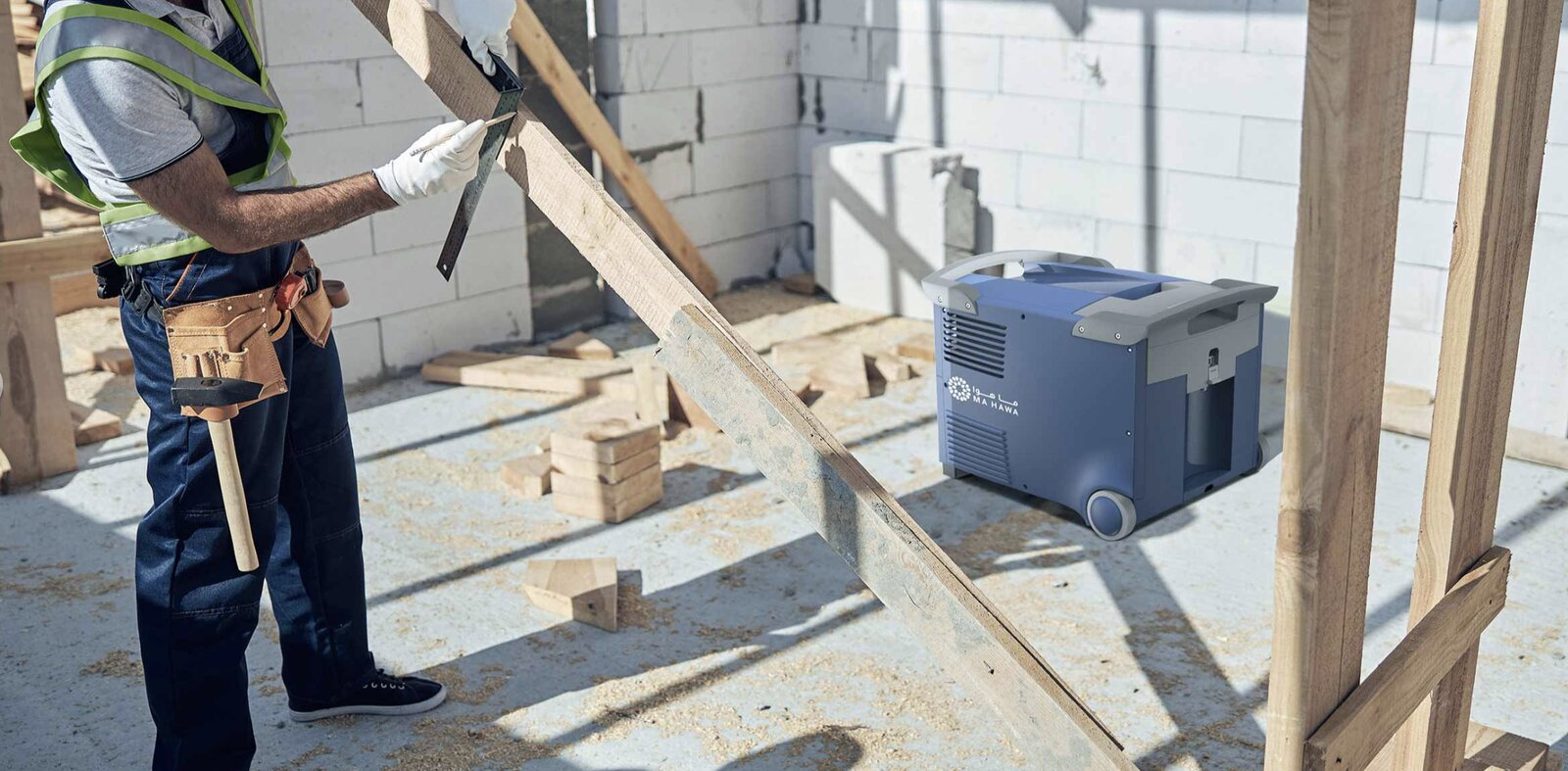
This UAE company produces clean water from thin air: UAE-based green tech company Baynunah Laboratories has officially launched a new product Ma Hawa that extracts potable water directly from the atmosphere at the Gitex Global tech show, Gulf Today reports.
How it works: Ma Hawa’s air-to-water generators leverage heat exchange tech patented by Watergen, transforming the surrounding air into potable water while conserving energy, the company notes on its website. Ma Hawa’s generators contain three filters — nano ceramic, carbon filter, and metals — that purify water vapor into drinkable water. The air is filtered through four stages to rid the water it generates from pollutants and bacteria. The company’s device also adds minerals like magnesium and calcium to enhance the water’s purity, Ma Hawa Head of Marketing Amro Ismaeal told Gulf Today.
The advantages: The company says the water it generates from atmospheric water vapor is free of nitrate, sulfate, phosphate, and chloride. It’s also low in sodium, and contains less contaminants compared to water extracted from natural reservoirs. “Water from air sources is the purest available … the source is unlimited and renewable given the natural hydrologic cycle, which continuously distills ground reservoirs to humidity,” the company says.
Different shapes and sizes for different applications: The company’s range of products includes a portable air-to-water generator that can produce up to 25 liters of water. For commercial use cases, the company also offers its GEN-M1 product, which it notes is a medium-scale portable unit that has a daily 220 liter production capacity without the need for infrastructure. For residential and office settings, the company offers a unit that produces 30 liters daily.
Current production capacity: The company’s production capacity currently reaches some 3k bottles of water daily, Ismaeal told the news outlet, and is expected to increase to 4.5k liters on an hourly basis when the company expands its factories in the Khalifa Economic Zones in Abu Dhabi by mid-November.
Why does this matter regionally? The MENA region is the most water-scarce region of the world, according to the Public Reference Bureau. Some 6.3% of the global population live in the region, and MENA only has 1.4% of the world’s renewable freshwater sources.
CLIMATE DIPLOMACY
UAE signs cooperation MoU with Jordan + talks trade relations with the US
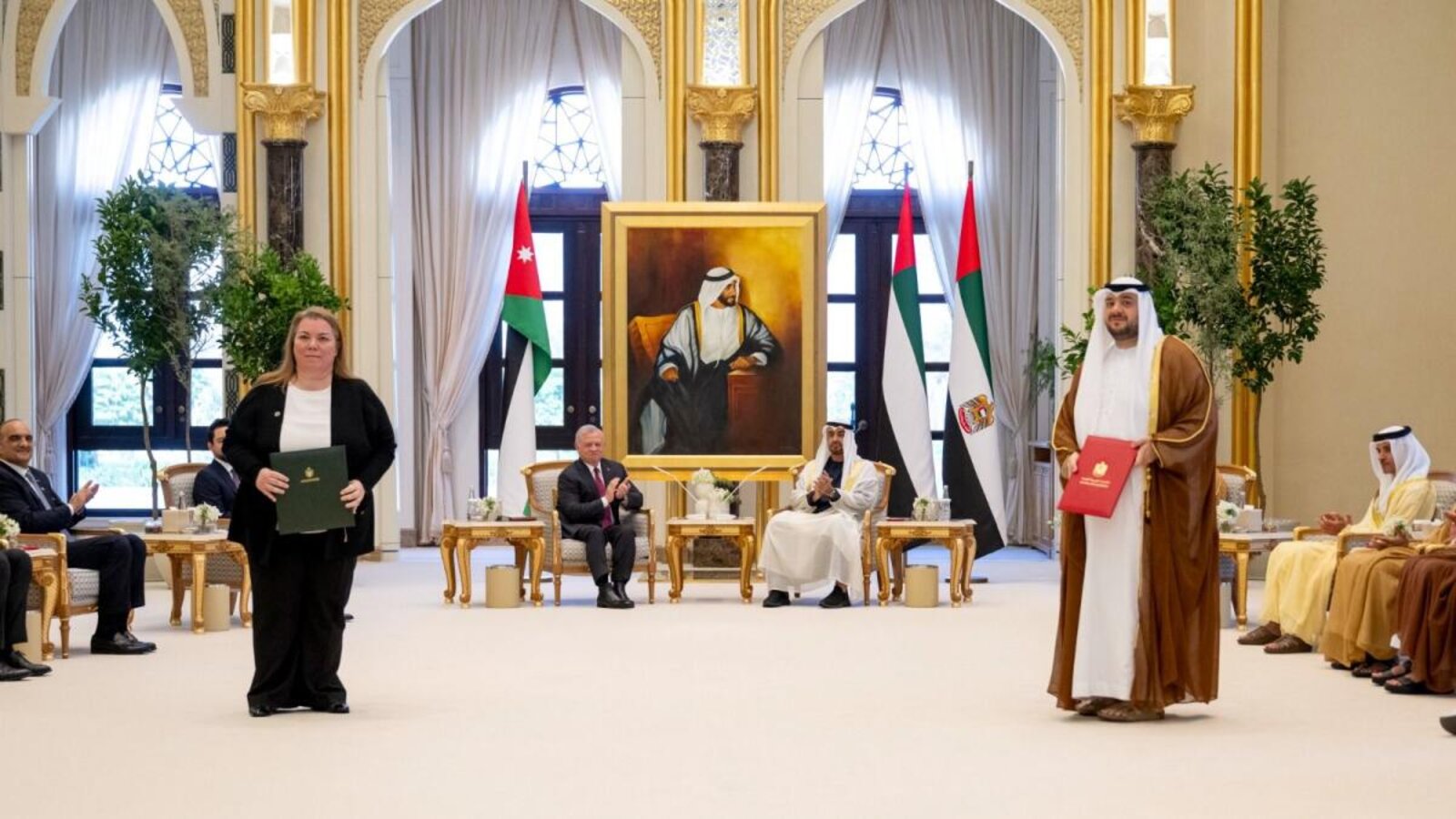
UAE and Jordan ink MoU to cooperate in key sectors including renewables: The investment ministries of the UAE and Jordan have signed an MoU to cooperate in key sectors including infrastructure, renewable energy, industrial projects, and manufacturing, Wam reported last week. The investment potential in Jordan is around USD 2 bn, according to the UAE’s investment ministry. The Abu Dhabi Investment and Holding Company (ADQ) also signed an MoU with the Jordan Investment Fund to create a joint investment fund to boost sustainable development in Jordan.
AND- The US and UAE held an Economic Policy Dialogue to discuss trade relations between the two countries, according to a joint statement released last week. They continued critical discussions on energy transition, food and energy security, investment, health security, aerospace, women’s economic empowerment, and the digital economy. The UAE also called on the US to join the Mangrove Alliance for Climate, while the US encouraged the UAE to sign the Joint Statement on Cooperation on Global Supply Chains and proposed the signing of a Science and Technology Agreement between the two countries.
OTHER STORIES WORTH KNOWING ABOUT THIS MORNING-
- An innovation corridor for Dubai: Dubai Chambers and the Hamburg Chamber of Commerce have signed an agreement to establish an “Innovation Corridor” between their markets. The initiative aims to support startups and companies offering innovative tech to achieve sustainable growth and expand into international markets. (Wam)
- Dewa and German delegation discuss cooperation on renewables: The Dubai Electricity and Water Authority (Dewa) and a German delegation discussed cooperation and exchanging expertise and best practices in clean and renewable energy. (Wam)
- Egypt and UNDP discuss water and climate issues: Egypt’s Water Resources and Irrigation Minister Hani Sewilam met with a delegate from the United Nations Development Program to explore cooperation on projects in flood protection and renewable energy. (Statement)
- Egypt + Singapore talk cooperation: Egypt's International Cooperation Minister Rania Al Mashat met with Singapore's Ambassador to Egypt Dominic Goh to discuss advancing cooperation in renewable energy, water treatment, infrastructure, and supporting Egypt’s Nexus of Water, Food and Energy program. (Statement)
ALSO ON OUR RADAR
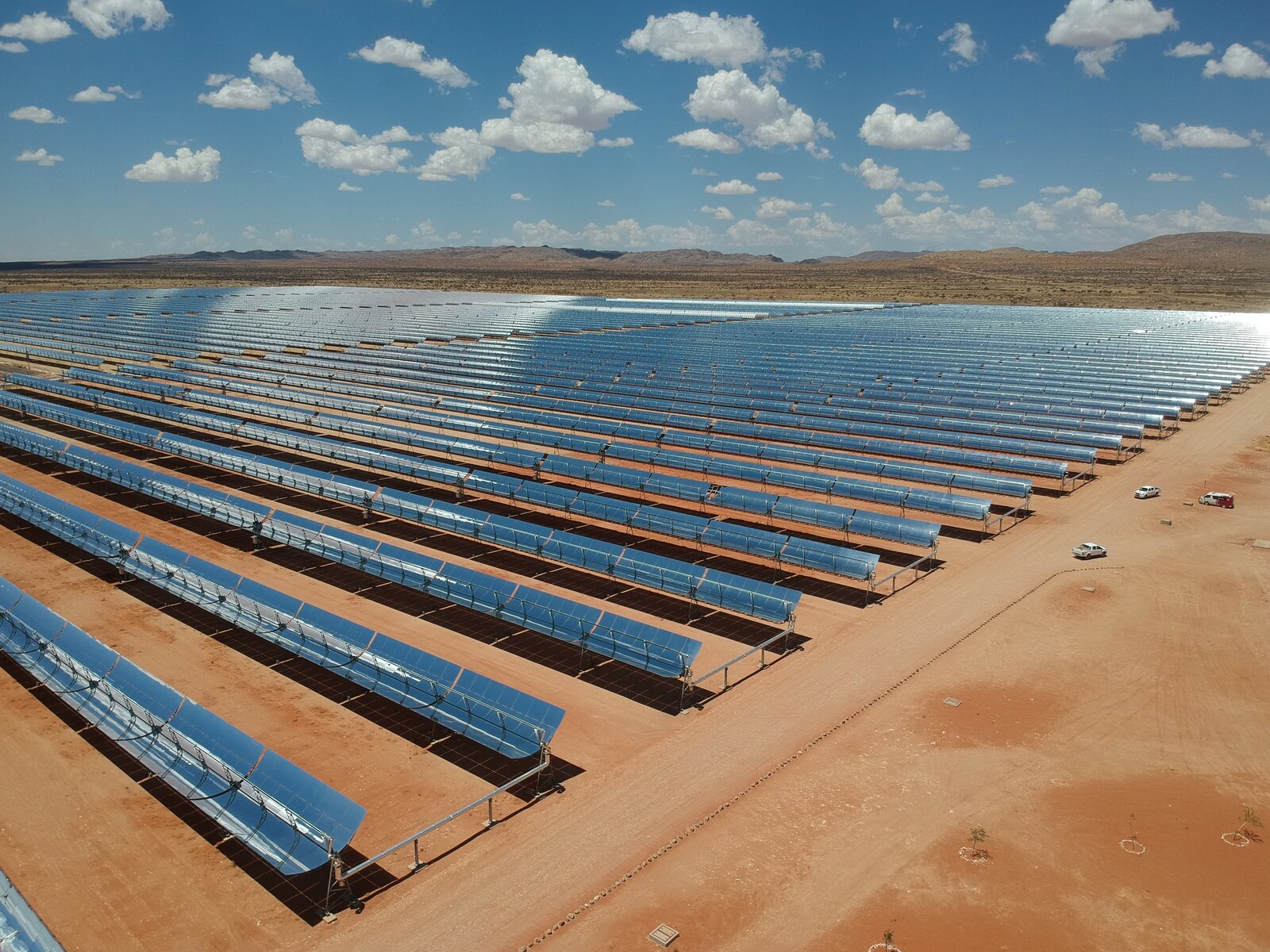
SOLAR-
Oman will remotely operate its biggest solar plant: Oman Electricity Transmission Company (OETC) has successfully completed tests to remotely operate the Ibri Solar Independent Power Project (IPP), according to a statement on Thursday. The 500 MW Ibri III Solar IPP is also the first solar plant in the Sultanate to be connected to the transmission grid.
REMEMBER- OETC plans to link as much as 2.6 GW of renewable energy to its transmission grid by 2027 through planned clean energy projects. This will also include a 1 GW solar IPP project in Manah that will be completed in 2Q 2024 and another 500 MW solar IPP proposed in the Al Kamil area by 2Q 2027.
WASTE MANAGEMENT-
KSA’s Tadweeer begins operations in Riyadh: Saudi-based recycling company Tadweeer has begun operating its main production plant in Riyadh’s Industrial Gate City after receiving industrial and operating licenses, according to a disclosure to Tadawul on Thursday. It is not clear which production unit received the licenses, but Tadweeer announced it was launching an iron production facility last May.
Tadweeer has been active lately: The company signed a USD 11.36 mn agreement with KSA-based firms Tebrak Trading & Contracting Company and Mounes Mohamed Alshayeb for Civil Construction for the development of e-waste repurposing plants in the country last January. The electronic waste recycling factories are expected to double Tadweeer’s sales once they become operational in 2Q 2024.
BIOFUELS-
Lootah Biofuels is collecting oil in Maldives: Dubai-based biofuels producer Lootah Biofuels signed an MoU with Maldives' Atmosphere Hotels & Resorts to collect used cooking oil and process it into biodiesel for energy use, Wam reported on Thursday. The expected volume of used cooking oil to be recycled or the operational timeline was not disclosed.
REMEMBER- There’s a biofuels production plant coming: Lootah Biofuels signed an agreement in April with Maldives state-owned utility provider Fenaka Corporation to establish the company’s first biofuel production plant from waste cooking oil overseas. The statement did not provide details on the planned production plant’s capacity, investment ticket, or a timeline for operations.
Oman’s biofuel startup Wakud is ramping up WtE services: Local biofuels producer Wakud has partnered with Omani service management firm Renaissance Services to increase the recycling of used cooking oil from the company’s industrial-scale kitchens, the company said last week. The biodiesel will be produced at Wakud’s Khazaen Industrial City, which has already converted over 9k liters of Renaissance’s used cooking oil into biodiesel. The biodiesel produced can cut carbon emissions by as much as 93% compared to fossil fuels.
Wakud is on an expansion spree: Wakud plans to establish a plant with a capacity of 250 tons per day at an investment cost between USD 120-150 mn in partnership with Omani-British green energy venture X2E. Wakud is also setting up a fish-waste recycling facility and a vegetable and fruit waste-to-biogas plant, with work expected to begin by 2H 2024.
OTHER STORIES WORTH KNOWING ABOUT THIS MORNING-
- Neom’s Oxagon breaks ground on research + innovation campus: Saudi Arabia’s Oxagon city in Neom has begun the construction of its research and innovation campus. The campus will span over 200k sqm and will include state-of-the-art labs, prototyping areas, co-working and office spaces, and digitally enabled facilities. (LinkedIn)
- AD Ports and RightShip partner on emissions solutions: The UAE’s AD Ports will begin using ESG-focused maritime platform RightShip’s Maritime Emissions Portal (MEP) to help the port measure and manage its emissions. (Statement)
- Mitsubishi extends maintenance contract for Egyptian power plants: Mitsubishi Power extended its 16-year long-term service agreement with Egypt for the maintenance and management of six gas turbines in the country. The Japanese International Corporation Agency-funded agreement will help improve power supply stability and efficiency, resulting in fuel savings and mitigating the effects of climate change. (Statement)
AROUND THE WORLD
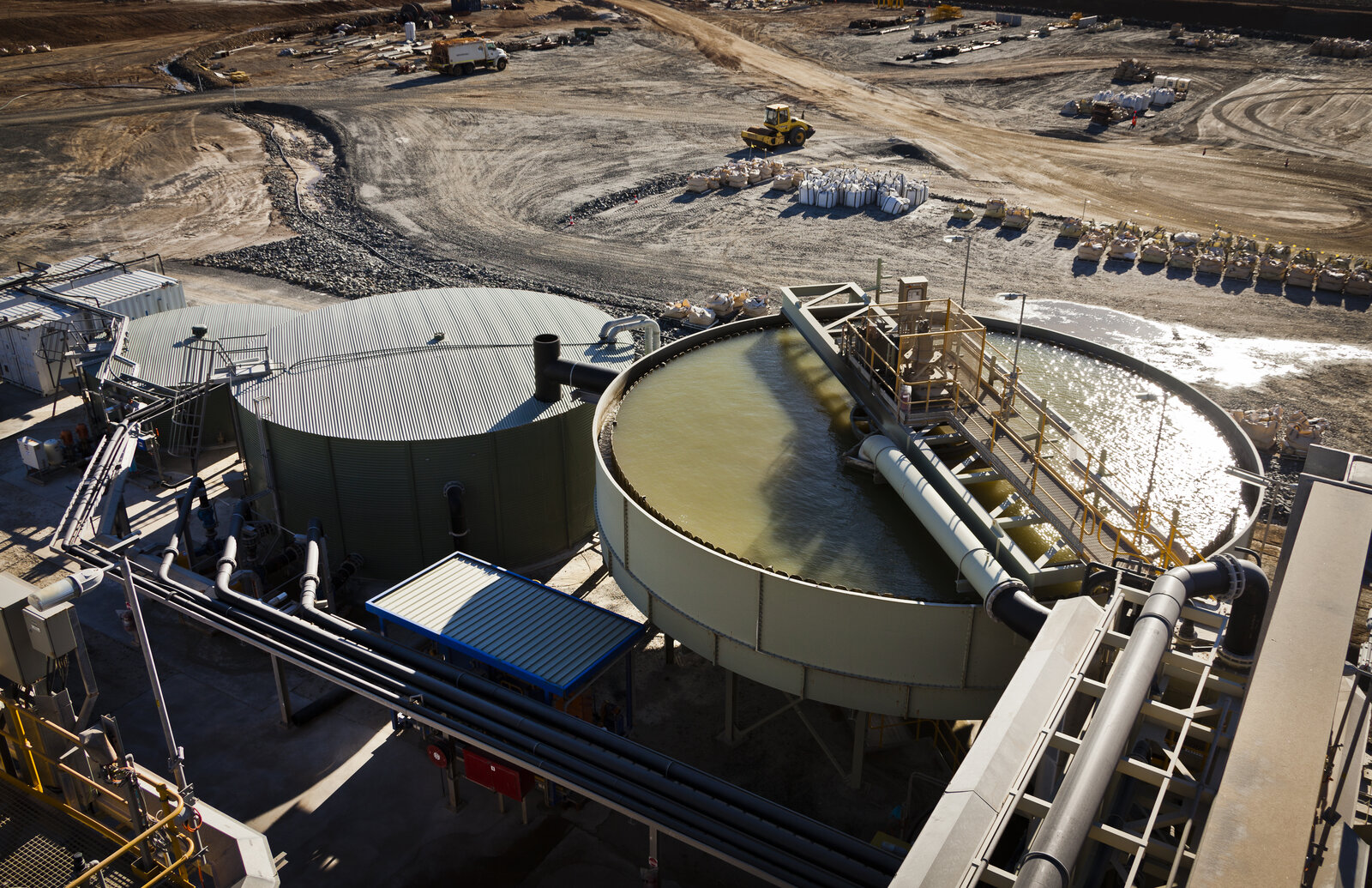
Zimbabwe’s lithium and energy sectors are in the spotlight: Chinese firms were awarded lithium exploration and energy production licenses that could amount to USD 2.79 bn worth of investments pouring into Zimbabwe, Bloomberg reported last week. USD 2.3 bn of China’s planned investments would be directed toward developing an energy and mining and minerals processing complex in Mapinga, while another China-led project focuses on the development of a 500 MW solar farm in the country. The development licenses awarded by the country in 3Q 2023 amount to USD 3.41 bn with Chinese firms making up two-thirds of 180 applications sent to Zimbabwe’s Development Agency. Next in line is the UAE which is looking to channel USD 498.5 mn in investments toward Zimbabwe’s economy, Bloomberg notes.
Zimbabwe and Africa have big lithium potential: The country raked in USD 209 mn from EV-critical lithium exports in the first nine months of 2023 and its lithium market grew from USD 1.8 mn in 2018 to USD 70 mn in 2022, Reuters reported, citing comments made by Zimbabwe’s Mines and Mining Development Minister Zhemu Soda. Chinese firms — including Zhejiang Huayou Cobalt, Chengxin Lithium Group Yahua Group, and Canmax Technologies — have shelled out over USD 1 bn since 2021 to develop lithium mining and processing projects in the country, Reuters notes. Africa is home to an estimated 5% of the world’s total lithium supplies and mining expansions are expected to bring up the continent's capacity from the current annual production rate of 40k tons to 497k tons by 2030.
Greece takes first steps in giant offshore wind development plans: Greece has released a draft plan identifying areas within its waters that will be allotted for the private development of at least 12.4 GW offshore wind farms, Reuters reported last week. The draft plan includes 25 eligible development areas spanning 2.7 sq km in the Aegean, Ionian, and Mediterranean seas, which will be up for grabs from 2025 until 2032 in two phases. Greece is aiming to install at least 2 GW of offshore wind power by 2030, representing one-tenth of its current onshore capacity. The Hellenic Hydrocarbons and Energy Resources Management Company (Herema) are in charge of Greece’s offshore wind expansion strategy.
Occidental Petroleum is selling 27.5k tons of direct air capture (DAC) CO2 removal credits to US-based TD Bank over four years, according to a statement released last week. TD Bank will buy the credits from 1PointFive's Stratos DAC Texas plant and will use some of the credits to offset its operational emissions. 1PointFive is a wholly-owned subsidiary of Occidental.
Occidental already has other giant prospects: Amazon said it was purchasing 250k tons of carbon credits from Occidental’s DAC plant over the next decade last September. Adnoc also explored participating in 1PointFive's DAC facility earlier this month. The petroleum giant also quietly offloaded its Century carbon capture and storage (CCUS) plant last year after a decade of economic issues.
OTHER STORIES WORTH KNOWING ABOUT THIS MORNING-
- Adani Green Energy is looking to borrow USD 1.8 bn from foreign lenders: Indian conglomerate Adani Group’s renewable energy arm Adani Green Energy is in talks with Deutsche Bank, Standard Chartered, Barclays, BNP Paribas, First Abu Dhabi Bank, and Rabobank, to borrow up to USD 1.8 bn for planned solar and wind projects. If signed, it could be among 20 biggest major currency loans in Asia this year. (Bloomberg)
- The US explores CCUS projects in national forests: The U.S. Forest Service is proposing a new rule to amend regulations and pave the way for the "exclusive and perpetual use" of national forest lands for carbon capture and sequestration projects. Some environmental groups oppose the proposed rule, arguing it would allow for the privatization of public land. (Reuters)
- The world is dimming the fluorescent lights: Delegates from 147 countries agreed to completely phase out fluorescent lights — the largest light-based mercury polluter — by 2027 at the Minamata Convention.The transition will offset 2.7 gT of CO2 and eliminate around 158 tons of mercury pollution. (Statement)
CALENDAR
NOVEMBER 2023
7-8 November (Tuesday-Wednesday): ADIA Lab Symposium on Climate Change and Health Sciences, Abu Dhabi, UAE.
9-10 November (Thursday-Friday): International Renewable Energy Agency Investment Forum, Uruguay.
9-15 November (Thursday-Wednesday): Intra-African Trade Fair 2023, Cairo, Egypt.
11-13 November (Saturday-Monday): GCC-Türkiye Economic Forum, Istanbul, Turkey.
15-17 November (Wednesday-Friday): WETEX and Dubai Solar Show, Dubai, UAE.
15-18 November (Wednesday-Saturday): DEWA’s First MENA Solar Conference, Dubai, UAE.
20-24 November (Monday-Friday) Aviation and Alternative Fuels conference, Dubai, UAE.
27-30 November (Monday-Thursday) Abu Dhabi Finance Week (ADFW), Abu Dhabi, UAE.
28-29 November (Tuesday-Wednesday): World Green Economy Summit (WGES), Dubai, UAE.
30 November – 12 December (Thursday-Tuesday): Conference of the Parties (COP 28), Dubai, UAE.
DECEMBER 2023
4 December (Monday): Saudi Green Initiative Forum, Dubai, UAE.
4 December (Monday): Abu Dhabi Sustainability Week (ADSW) summit, Dubai, UAE.
4-7 December (Monday-Thursday): International Conference on Global Warming, Ras Al Khaimah, UAE.
6-7 December (Wednesday-Thursday): Reuters’ Energy Transition MENA conference, Dubai, UAE.
7-8 December (Thursday-Friday): Future Investment Initiative (FII) Priority, Hong Kong.
8 December (Friday): Youth for Sustainability Forum (Y4S), Dubai, UAE.
12-14 December (Tuesday-Thursday): Green Hydrogen Summit Oman, Oman Convention and Exhibition Center, Muscat, Oman.
18-20 December (Monday-Wednesday): Saudi Arabia Smart Grid Conference, Hilton Riyadh Hotel & Residences, Riyadh, Saudi Arabia.
JANUARY 2024
9-11 January (Tuesday-Thursday): Future Minerals Forum, Riyadh, Saudi Arabia.
FEBRUARY 2024
26-28 February (Monday-Wednesday): Management and Sustainability of Water Resources, Dubai, UAE.
MARCH 2024
4-6 March (Monday-Wednesday): International Conference on Sand and Dust Storms in the Arabian Peninsula, Riyadh, Saudi Arabia.
APRIL 2024
16-18 April (Tuesday-Thursday): World Future Energy Summit, Abu Dhabi, UAE.
23-25 April (Tuesday-Thursday): Connecting Green Hydrogen MENA, Dubai, UAE.
MAY 2024
19-21 May (Sunday-Tuesday): Saudi Energy Convention, Riyadh, KSA.
JUNE 2024
5 June (Wednesday): World Environment Day, Saudi Arabia.
OCTOBER 2024
10-12 October (Tuesday-Thursday): Autonomous E-Mobility Forum, Doha, Qatar.
DECEMBER 2024
2-13 December (Monday-Friday): Conference of the Parties (COP16) to the United Nation Convention to Combat Desertification, Riyadh, KSA.
EVENTS WITH NO SET DATE
2024
Early 2024: The 2023 US Algeria Energy Forum, Washington DC, USA.
12-14 February (Monday-Wednesday): Sustainable Aviation Futures MENA Congress, Dubai, UAE.
End-2024: Emirati Masdar’s 500 MW wind farm in Uzbekistan to begin commercial operations.
QatarEnergy’s industrial cities solar power project will start electricity production.
2025
International Union for Conservation of Nature World Conservation Congress, Abu Dhabi, UAE.
UAE to have over 1k EV charging stations installed.
2026
UITP Global Public Transport Summit, Dubai, UAE.
Annual Meetings of the World Bank and the International Monetary Fund, Bangkok, Thailand.
1Q 2026: QatarEnergy’s USD 1 bn blue ammonia plant to be completed.
End-2026: HSBC Bahrain to eliminate single-use PVC plastic cards.
2027
MENA’s district cooling market is expected to reach USD 15 bn.
2030
UAE’s Abu Dhabi Commercial Bank (ADCB) wants to provide AED 35 bn in green financing.
UAE targets 14 GW in clean energy capacity.
Tunisia targets 30% of renewables in its energy mix.
Qatar wants to generate USD 17 bn from its circular economy, creating 9k-19k jobs.
Morocco’s Xlinks solar and wind energy project to generate 10.5 GW of energy.
2035
Qatar to capture up to 11 mn tons of CO2 annually.
2045
Qatar’s Public Works Authority’s (Ashghal) USD 1.5 bn sewage treatment facility to reach 600k cm/d capacity.
2050
Tunisia’s carbon neutrality target.
2060
Nigeria aims to achieve its net-zero emissions target.
Enterprise Climate is available without charge thanks to the generous support of HSBC (tax ID: 204-901-715), the leading corporate and retail lender in Egypt; and Infinity Power (tax ID: 305-170-682), the leading generator and distributor of renewable energy in Africa and the Middle East. Enterprise Climate is delivered Mon-Thurs before 4 am UAE time. Were you forwarded this copy? Sign up for your own delivery at climate.enterprise.press. Contact us on climate@enterprisemea.com.


